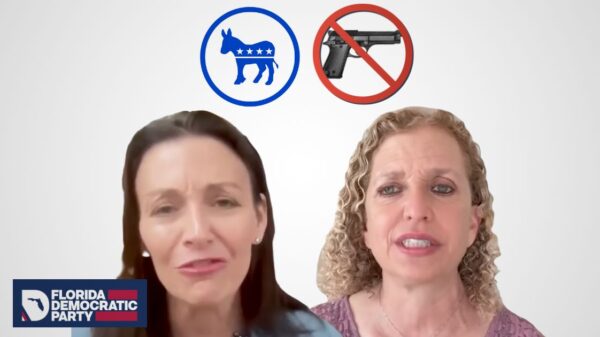On Monday, Florida Agriculture Commissioner Nikki Fried submitted written testimony on the state of Florida’s request to assume administration of the Clean Water Act’s Section 404 program from the U.S. Environmental Protection Agency (EPA).
In her comments, Fried noted her concerns with the Florida Department of Environmental Protections’ (DEP) proposal, highlighting the fact that the only other two states which have assumed permitting authority struggled to adequately implement the program.
On August 20, the EPA received a request from Florida to take over the administration of the Clean Water Act’s (CWA) Section 404 program to regulate the discharge of dredged or fill material into waters within the jurisdiction of the state. In the 43 years since the CWA was amended to provide for state assumption, only two states have assumed administration of the Section 404 program, Michigan and New Jersey. Last week, Commissioner Fried shared her concerns with this proposal.
Florida is the first state to submit a complete package requesting to administer the program since 1994. As part of the review process, the EPA asked for input from other applicable agencies, reviewing Florida’s proposed program for consistency with the CWA, and seeking public comments to be submitted on or before November 2, 2020 and held two virtual public hearings on October 21 and 27.
Section 404 of the CWA requires a permit before dredged or fill material may be discharged into waters of the United States, and provides states and tribes the option of assuming, or taking over, the permitting responsibility and administration of the Section 404 permit program for certain waters. Section 404 permits for those assumed waters would be issued by the state or tribe instead of the U.S. Army Corps of Engineers.
The complete written testimony, which was submitted online, can be read below.
Full written testimony from Commissioner Nikki Fried:
November 2, 2020
Docket Number: EPA-HQ-OW-2018-0640 (404 Assumption)
Re: State of Florida Request to Assume Administration of the Clean Water Act Section 404 Dredged or Fill Permitting Program
The Florida Department of Agriculture and Consumer Services (FDACS) appreciates the ability to provide comments on the proposed delegation of permitting under Section 404 of the Clean Water Act to the Florida Department of Environmental Protection (DEP). A clean and safe environment is vital to sustaining Florida’s way of life and economic foundation. Public lands, wetlands, marshes, and estuaries are vital to maintaining and improving sustainable recharge for our groundwater aquifers, as well as clean and safe waterways. Tourism, fishing, boating, and related businesses provide significant revenue to the benefit of those who live, work, and enjoy life in our state. Adequate regulation of activities that impact these resources is vital to ensure that degradation does not occur.
The elimination of additional federal scrutiny for projects that have the potential to significantly impact Florida’s natural resources requires existing state programs to demonstrate the ability to protect those resources. A significant number of stakeholders have indicated noteworthy concerns that adequate evidence has not yet been provided to sufficiently demonstrate that DEP has the resources to tackle the substantial increases in workload that will be required by the delegation, or that existing state regulatory programs are adequate, to provide sufficient protections to the water resources of Florida in the face of increasing development impacts that continue to reduce the state’s open lands and agricultural landscapes. Given the value of the water resources and wetlands to the citizens of our state, any delegation of permitting authority to DEP must contain assurances that existing levels of protection of the natural resources will be preserved, and that sufficient resources are available for DEP to implement regulatory programs in an efficient and effective manner. Without those assurances, DEP will face the same fate as Michigan and New Jersey, the other two states that have assumed 404 permitting authority and required remediation of their state programs due to struggles in maintaining the required levels of regulatory integrity and resources to adequately implement the program.
Additionally, given the value of transparency and public participation as part of environmental governance, any delegation should preserve the levels of public participation and comment afforded by the National Environmental Policy Act through the development of Environmental Impact Statements for projects with significant impacts. The delegation should also require the state to demonstrate that the protection of species against the possible loss of protections and stringent levels of review provided by the Endangered Species Act will be maintained. As part of any delegation, DEP should additionally be required to demonstrate that existing state programs adequately explore practicable alternatives to impacts as part of the permitting process prior to allowing for mitigation, as well as ensuring that cumulative impacts are properly incorporated and considered as part of any impact analysis.
FDACS continues to be supportive of exploring opportunities to ensure and expedite progress on those vital environmental restoration and water resource protection projects being implemented through local government and state agency programs, including projects being undertaken as part of the Comprehensive Everglades Restoration Plan. Additionally, the state’s regulatory programs should ensure consistency, efficiency, transparency, and public participation, and the ultimate protection of the water resources of Florida for the benefit of its citizens. FDACS remains committed to working with agency partners at both the state and federal levels to ensure that these joint goals are realized, and we look forward to continued engagement regarding the delegation of the 404 permitting program.



















